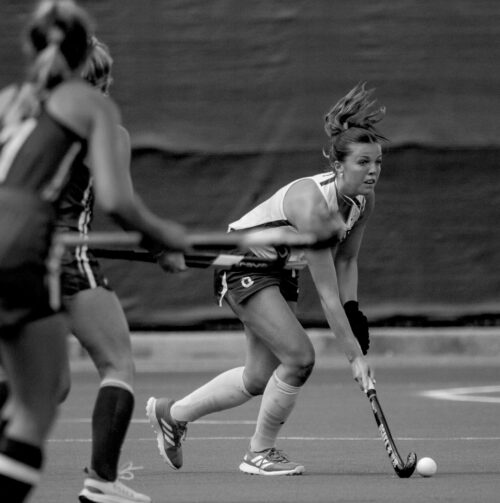Bronte-May Brough ’26’s primary education included all of the usual suspects: learning to read, write, multiply, push pass, sweep, oh, and aerial. Brough first started playing field hockey when she was seven years old.
Growing up, Brough learned how to play hockey on grass, but once she moved to prep school, she had the opportunity to play on astroturf. In England, Brough noted how “it’s quite a small [field] hockey circle,” and she attributes her closest friendships to this intimate environment.
In England, there are two distinct parts of field hockey. Brough explained how mostly “private boarding schools play field hockey, and they’re notorious for being the only schools that do play.” English schools compete in what Brough referred to as “school nationals,” which are primarily just for private boarding schools with the exception of a few state schools. Outside of school athletics, there is additionally a club field hockey scene in England. For Brough, though, her “school actually set up a club that was affiliated with the school, and so it was basically the same school team as [her] club team.”
Brough first played with England national squads when she was 15, but she explained that the process began much earlier. While other middle schoolers were awkwardly navigating the trials and tribulations of algebra and school dances, Brough, at about age 12 or 13, “started playing in the development centers, from which you then get selected for the national team.”
If selected from the development process to continue playing on the national squad, players are organized into an Under 16, Under 18, Under 21, and senior women’s team. Brough explained that being on these teams is no small commitment. “We play games against other nations, like, obviously the home nations—Wales, Scotland—and then we’d play a lot against Ireland, Germany, the Netherlands.”
At the U21 level, things get even more serious. Brough continued to explain how at the higher levels, players are able compete in the Junior World Cup and Junior Euros tournaments, which are bigger undertakings. In terms of time commitment, players who compete in these tournaments are attending training camps every other week as opposed to playing together only monthly. Impressively, Brough played in the Junior World Cup while she was technically still eligible for the U18 team.
When it came to the college recruitment process, Brough’s decision wasn’t exclusively defined by shin guards, sticks, and goggles. What drew her to America was “the fact that academics and athletics [are] respected, especially at Harvard, kind of equally. And for [her], academics is a huge part of [her] life.”
At the end of her final year of high school, Brough competed with the England team at the Junior World Cup for the first time. She noted how because of COVID-19, her age group fluctuated, and as a result, her team was the youngest competing at the Junior World Cup. Nonetheless, Brough explained how her team, as the “underdogs” took it game by game, and in the end came out with a bronze medal. This was the best that England had ever done in this tournament. On a larger scale, Brough reflected that this win “kind of set up the expectation of [them] to win medals at major tournaments like that, and gave [them] a bit more confidence, and kind of put [them] on the map a little bit.”
Playing hockey in America for two years now, Brough still plays for her European team which she did not always anticipate to be an option. “After the Junior World Cup, I told them that I was coming to America, and obviously I can’t fly back and train every other weekend. And so I thought the door was closed on England hockey, but they changed their protocol kind of and said that if it’s a summer tournament, then I could still be eligible to play it as long as I go and train the entire summer.”
At a glance, this might not seem like a huge undertaking, but Brough walked us through how “going back is kind of weird, trying to adapt back to the style and the speed of play, and obviously, different players, different playing styles.”
This past summer, Brough played in Barcelona in the Euros tournament where qualification for the next Junior World Cup was on the line. In the previous Euros, Brough shared how heartbreaking it was when her team came fourth, but accredited this loss to a shared determination amidst the team. “We had a relatively easy group, and we placed second in the group after losing to Germany two-nil, but we crashed out of the semi-finals playing the Dutch, which was obviously really hard, and it was honestly a bigger defeat than we’d have hoped for.”
Even with these uniquely high-paced, high-caliber field hockey experiences, Brough’s transition back to American field hockey has been seamless. In terms of the team’s style, Brough noted that playing on the Harvard team resembles a style of hockey that “is halfway in between European and American field hockey because the international aspects of [their] team brings field hockey culture and tradition and playing styles from everywhere.” Brough is still eligible to play for the next Junior World Cup, though her participation is dependent on the timing of the tournament.
When reflecting on what the Harvard team means to her, Brough shared: “American [field] hockey honestly made me fall back in love with hockey again. The team’s amazing—we all share the same love for field hockey—and I’m super, super excited about this season.”
Rania Jones ’27 (rjones@college.harvard.edu) was awarded the nickname of FIGHT CLUB on her high school field hockey team.

